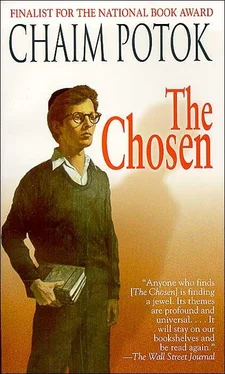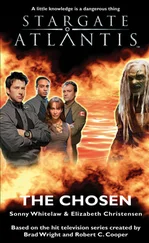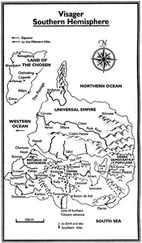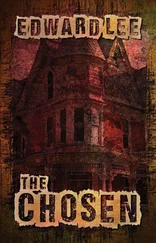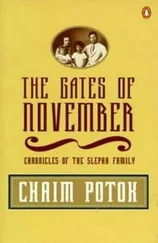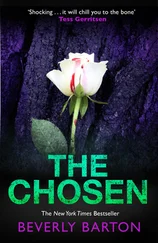'I'm sorry to hear that.'
'How about you?'
'I have a brother and a sister. My sister's fourteen and my brother is eight. I'm going on sixteen.'
'So am I,' I said.
We discovered that we had been born in the same year, two days apart.
'You've been living five blocks away from me all these years, and I never knew who you were,' I said.
'We stick pretty close together. My father doesn't like us to mix with outsiders.'
'I hope you don't mind my saying this, but your father sounds like a tyrant.'
Danny didn't disagree. 'He's a very strong-willed person. When he makes up his mind about something, that's it, finished.'
'Doesn't he object to your going around with an apikoros like me?'
'That's why he wants to meet you.'
'I thought you said your father never talks to you.'
'He doesn't. Except when we study Talmud. But he did this time. I got up enough courage to tell him about you, and he said to bring you over today. That's the longest sentence he's said to me in years. Except for the time I had to convince him to let us have a ball team.'
'I'd hate to have my father not talk to me.'
'It isn't pleasant,' Danny said very quietly. 'But he's a great man. You'll see when you meet him.'
'Is your brother going to be a rabbi, too?'
Danny gave me a queer look. 'Why do you ask that?'
'No special reason. Is he?'
'I don't know. Probably he will.' His voice had a strange, almost wistful quality to it. I decided not to press the point. He went back to talking about his father.
'He's really a great man, my father. He saved his community. He brought them all over to America after the First World War.'
'I never heard about that,' I told him.
'That's right,' he said, and told me about his father's early years in Russia. I listened in growing astonishment.
Danny's grandfather had been a well-known Hasidic rabbi in a small town in southern Russia, and his father had been the second of two sons. The firstborn son had been in line to inherit his father's rabbinic position, but during a period of study in Odessa he suddenly vanished. Some said he had been murdered by Cossacks; for a time there was even a rumor that he had been converted to Christianity and had gone to live in France. The second son was ordained at the age of seventeen, and by the time he was twenty had achieved an awesome reputation as a Talmudist.
When his father died, he automatically inherited the position of rabbinic leadership. He was twenty-one years old at the time.
He remained the rabbi of his community throughout the years of Russia's participation in the First World War. One week before the Bolshevist Revolution, in the autumn of 1917, his young wife bore him a second child, a son. Two months later, his wife, his son, and his eighteen-month-old daughter were shot to death by a band of marauding Cossacks, one of the many bandit gangs that roamed through Russia during the period of chaos that followed the revolution. He himself was left for dead, with a pistol bullet in his chest and a saber wound in his pelvis. He lay unconscious for half a day near the bodies of his wife and children, and then the Russian peasant who tended the stove in the synagogue and swept its floor found him and carried him to his hut, where he extracted the bullet, bathed the wounds, and tied him to the bed so he would not fall out during the days and nights he shivered and screamed with the fever and delirium that followed.
The synagogue had been burned to the ground. Its Ark was a gutted mass of charred wood, its four Torah scrolls were seared black, its holy books were piles of gray ash blown about by the wind. Of the one hundred eighteen Jewish families in the community only forty-three survived.
When it was discovered that the rabbi was not dead but was being cared for by the Russian peasant, he was brought into the still intact home of a Jewish family and nursed back to health. He spent the winter recovering from his wounds. During that winter the Bolshevists signed the treaty of Brest-Litovsk with Germany, and Russia withdrew from the War. The chaos inside the country intensified, and the village was raided four times by Cossacks. But each of those times the Jews were warned by friendly peasants and were concealed in the woods or in huts. In the spring, the rabbi announced to his people that they were done with Russia, Russia was Esav and Edam, the land of Satan and the Angel of Death. They would travel together to America and rebuild their community.
Eight days later, they left. They bribed and bargained their way through Russia, Austria, France, Belgium, and England.
Five months later, they arrived in New York City. At Ellis Island the rabbi was asked his name, and he gave it as Senders. On the official forms, Senders became Saunders. After the customary period of quarantine, they were permitted to leave the island, and Jewish welfare workers helped them settle in the Williamsburg section of Brooklyn. Three years later the rabbi-married once again, and in 1929, two days before the stock market crash, Danny was born in the Brooklyn Memorial Hospital. Eighteen months later his sister was born, and five and a half years after the birth of his sister, his brother was born by Caesarean section, both in that same hospital.
'They all followed him?' I asked. 'Just like that?'
'Of course. They would have followed him anywhere.'
'I don't understand that. I didn't know a rabbi had that kind of power.'
'He's more than a rabbi,' Danny said. 'He's a tzaddik.'
'My father told me about Hasidism last night. He said it was a fine idea until some of the tzaddikim began to take advantage of their followers. He wasn't very complimentary.'
'It depends upon your point of view,' Danny said quietly.
'I can't understand how Jews can follow another human being so blindly.'
'He's not just another human being.'
'Is he like God?'
'Something like that. He's a kind of messenger of God, a bridge between his followers and God.'
'I don't understand it. It almost sounds like Catholicism.'
'That's the way it is,' Danny said, 'whether you understand it or not.'
'I'm not offending you or anything. I just want to be honest.'
'I want you to be honest,' Danny said.
We walked on in silence.
A block beyond the synagogue where my father and I prayed, we made a right turn into a narrow street crowded with brownstones and sycamores. It was a duplicate of the street on which I lived; but a good deal older and less neatly kept. Many of the houses were unkempt, and there were very few hydrangea bushes or morning glories on the front lawns. The sycamores formed a solid, tangled bower that kept out the sunlight. The stone banisters on the outside stairways were chipped, their surfaces blotched with dirt, and the edges of the stone steps were round and smooth from years of use. Cats scrambled through the garbage cans that stood in front of some of the houses, and the sidewalks were strewn with' old newspapers, ice cream and candy wrappers, worn cardboard cartons, and torn paper bags. Women in longsleeved dresses, with kerchiefs covering their heads, many with infants in their arms, others heavily pregnant, sat on the stone steps of the stairways, talking loudly in Yiddish. The street throbbed with the noise of playing children who seemed in constant motion, dodging around cars, racing up and down steps, chasing after cats, climbing trees, balancing themselves as they tried walking on top of the banisters, pursuing one another in furious games of tag – all with their fringes and earlocks dancing wildly in the air and trailing out behind them. We were walking quickly now under the dark ceiling of sycamores, and a tall, heavily built man in a black beard and black caftan came alongside me, bumped me roughly to avoid running into a woman, and passed me without a word. The liquid streams of racing children, the noisy chatter of long-sleeved women, the worn buildings and blotched banisters, the garbage cans and the scrambling cars all gave me the feeling of having slid silently across a strange threshold, and for a long moment I regretted having let Danny take me into his world.
Читать дальше
